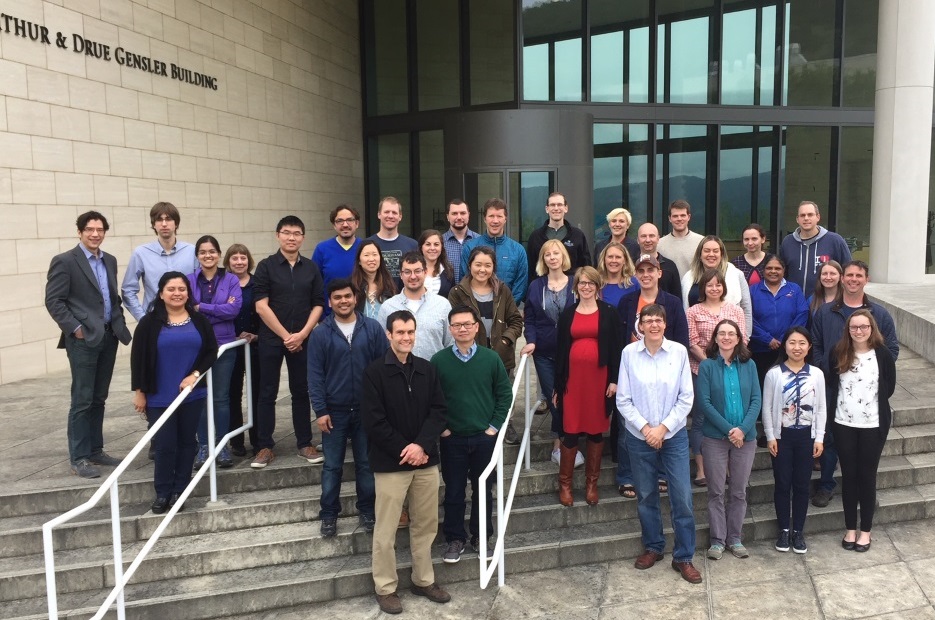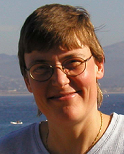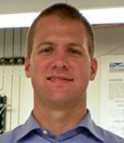Table of Contents |
guest 2025-12-14 |
Register
Instructor List
Course Schedule
Thanks!
During the week of April 2 – 6 2018, 28 participants and 12 instructors delivered the third Bay-area Targeted Proteomics Course at the picturesque Buck Institute for Research on Aging. Drawing from the area's deep biotechnology community, the course featured an almost even split between industry participants and those from academic institutions, with participants from several different countries (and continents).
With an impressive collection of top-flight instructors and an eager group of participants, it made for an intense, collaborative week of discovery and learning on a wide range of targeted proteomic methods and statistical approaches, and even including a metabolomics section. Initial feedback indicates high marks for both the information delivered, as well as the quality of the instructors of the course.
-- Birgit, Ruth and Brendan

Register

Dear Skyline Users:
The Buck Institute for Research on Aging and the Skyline Team are pleased to co-announce the 3rd Buck Institute Targeted Proteomics Course on April 2 - 6, 2018 in the Northern San Francisco Bay Area, California (Novato).
The course schedule will address emerging quantitative proteomics strategies. This will include the use of Skyline in the context of different quantitative targeted workflows, assay development, generation of acquisition methods, processing of quantitative data sets, as well as using statistical and R software packages and tools in Skyline. Data examples will cover high through-put SRM, MS1 Filtering, parallel reaction monitoring (PRM) and data-independent acquisition (DIA/SWATH). Data examples will range from analysis of posttranslational modifications, work with human plasma for biomarker analysis and projects involving protein-protein interactions. In addition, small molecule Skyline features and applications will be presented.
The instructor list includes researchers and software developers with a wealth of combined experience in targeted and quantitative proteomics, and both using and creating Skyline to meet the needs of this research approach.
Space is limited. However, all applications submitted by the deadline of January 5, 2018 will be considered equally on the merits of the application.
We hope you will join us for this exciting week.
-- Birgit Schilling, Ph.D.; (Buck Institute, Novato)
Workshop coordinator
When: April 2 - 6, 2018
Where: Buck Institute is in Novato, California (north of San Francisco) (map) (photo)
Cost: $400 academic, $1,500 industry
Apply by: Friday January 5, 2018
Notification Date: Wednesday January 17, 2018
Latest cancelation date: February 1, 2018
Pay by: Friday, February 16, 2018
Participants: ~30
Room & Board: Not included
[registration closed]
Related Links:
Course Schedule
Instructor List
Instructor List
The following instructors and speakers have agreed to contribute their expertise to the success of Buck Institute Course:
 |
Birgit Schilling, Ph.D. Birgit is Research Associate Professor and the Director of the Mass Spectrometry and Chemistry Core at the Buck Institute for Research on Aging in Novato, CA. Research projects include investigations of neurodegenerative diseases, aging, cancer, mitochondrial damage, protein posttranslational modifications including acetylation in bacteria, the role of surface glycoconjugates in bacterial pathogenesis etc., but also mass spectrometric method development. Birgit has worked in the field of protein quantitation to assess differential protein expression or changes in posttranslational modifications, particularly using selected reaction monitoring stable isotope dilution mass spectrometry (SRM-SID-MS), and other chemical and metabolic labeling quantitative workflows, i.e., iTRAQ and SILAC technologies. Birgit has participated in large multi-laboratory SRM verification studies taking advantage of Skyline’s platform independent features. In recent years, she has used more and more label free protein quantitation approaches to investigate discovery mass spectrometric data sets (Skyline MS1 Filtering), as well as newer quantitative workflows, such as high resolution data-independent acquisitions (SWATH and PRM). Birgit has co-developed some algorithms for the Skyline Tool Store and she also extensively uses the interactive data sharing features of the Panorama webserver. |
|
 |
Ruth Huttenhain, Ph.D. Ruth Huttenhain is an Assistant Adjunct Professor at University of California San Francisco (UCSF). During her Ph.D. with Prof. Ruedi Aebersold at the Institute of Molecular Systems Biology, ETH Zurich, Ruth developed high-throughput and large scale targeted mass spectrometric approaches and applied them to the verification of plasma-based biomarkers. In 2013 Ruth joined the lab of Prof. Nevan Krogan at UCSF as a Postdoctoral Scholar. Her postdoctoral and current research focuses on leveraging quantitative mass spectrometry and genetic approaches to study dynamics of protein interaction networks combining classical affinity purification and novel proximity-based biotinylation approaches. |
|
 |
Brendan MacLean Brendan worked at Microsoft for 8 years in the 1990s where he was a lead developer and development manager for the Visual C++/Developer Studio Project. Since leaving Microsoft, Brendan has been the Vice President of Engineering for Westside Corporation, Director of Engineering for BEA Systems, Inc., Sr. Software Engineer at the Fred Hutchinson Cancer Research Center, and a founding partner of LakKey Software. In this last position he was one of the key programmers responsible for the Computational Proteomics Analysis System (CPAS), made significant contributions to the development of X!Tandem and the Trans Proteomic Pipeline, and created the LabKey Enterprise Pipeline. Since August, 2008 he has worked as a Sr. Software Engineer within the MacCoss lab and been responsible for all aspects of design, development and support in creating the Skyline Targeted Proteomics Environment and its growing worldwide user community. |
|
 |
Veronica Anania, Ph.D. Veronica received a Ph.D. in Molecular and Cell Biology from UC Berkeley and currently works as a scientist in biomarker development at Genentech. Her research is focused on implementing targeted and discovery proteomic approaches to develop multiplexed biomarker panels to monitor changes in autoimmune disorders. Additionally, she is developing a targeted method to quantify changes in bioactive lipids from a variety of biological matrices to support respiratory and infectious disease programs. |
|
 |
Michael J. MacCoss, Ph.D. Mike became interested in biomedical applications of mass spectrometry while working in Dr. Patrick Griffin’s protein mass spectrometry lab at Merck Research Laboratories. He obtained a Ph.D. with Professor Dwight Matthews and pursued a postdoc with Professor John R. Yates III. In 2004 he started the MacCoss lab at the University of Washington and it became obvious that while mass spectrometry data could be collected quickly and robustly, the lack of computational tools for the visualization and analysis of these data was a stumbling block. In 2009 he recruited Brendan MacLean with the goal of developing professional quality software tools for quantitative proteomics. Mike has worked closely with the Skyline development team and our outstanding group of laboratory scientists and collaborators to ensure that our software uses analytical approaches that have been thoroughly vetted by the mass spectrometry community. |
|
 |
Lindsay K. Pino Lindsay is a Ph.D. candidate at the University of Washington’s Department of Genome Sciences in the MacCoss lab. Her research interests include the development of large-scale proteomics assays using data independent acquisition-MS to investigate complex mixtures and applying computational techniques to mine the resulting high-dimensional data. Prior to joining the MacCoss lab, she worked as a research associate at the Broad Institute of MIT and Harvard in Dr. Steve Carr’s Proteomics Platform, where she worked under Dr. Susan Abbatiello to improve the speed and selectivity of targeted proteomics assays using high-field asymmetric waveform ion mobility spectrometry (FAIMS). |
|
 |
Hannes Röst, Ph.D. Hannes studied Biochemistry and Computational Biology at ETH Zurich (Switzerland). In his Ph.D. with Ruedi Aebersold at ETH Zurich, Hannes applied computational and statistical methods to investigate targeted proteomics strategies and their application to produce highly consistent and reproducible protein measurements across many samples using SWATH-MS. As a postdoctoral fellow at Stanford University with Mike Snyder, he used mass spectrometric methods to perform personalized, longitudinal studies on human subject. He currently holds a faculty position at the University of Toronto where he contributes to improving the theoretical understanding of targeted proteomics through simulation, provides high-throughput analysis pipelines for proteome-wide targeted proteomics experiments and developed alignment algorithms for targeted proteomics and metabolomics data. |
|
 |
J. Will Thompson, Ph.D. Will is the Assistant Director of the Duke Proteomics and Metabolomics Shared Resource, and Assistant Research Professor in the Department of Pharmacology and Cancer Biology. He received his Ph.D. in Ultrahigh Pressure Liquid Chromatography from the laboratory of Dr. Jim Jorgenson at the University of North Carolina at Chapel Hill, and subsequently joined the Disease and Biomarker Proteomics group led by Dr. Arthur Moseley at GlaxoSmithKline. In 2007, Dr. Thompson assisted Dr. Moseley in founding the Duke Proteomics Core Facility, which as of winter 2017 has 10 full time scientists. Dr. Thompson has overseen the expansion of the group's efforts into small molecule and metabolomics analysis, which now represents roughly 40% of the work of the Shared Resource. His research in part focuses on application of novel proteomics and targeted metabolomics assays to clinical and basic science research applications, with special emphasis on Alzheimer's Disease. The Core has completed over 1200 projects for nearly 200 principal investigators since 2007, and works with investigators both inside and outside the Duke School of Medicine. |
|
 |
Brian Searle Brian Searle is the co-founder and chairman of the board of Proteome Software, Incorporated. Following an undergraduate degree in chemistry from Reed College, Brian was mentored in MS/MS-based proteomics by Ashley McCormack and software development by Mark Turner in Srinivasa Nagalla’s lab at Oregon Health and Science University. In 2004 Brian co-founded Proteome Software with Mark and Ashley to produce and distribute cutting-edge data analysis software for proteomicists. As the owner of Proteome Software, Brian has produced numerous innovations in the analysis of MS/MS-based proteomics data. Brian is a member of the American Society for Mass Spectrometry (ASMS) and served on the board of directors for that organization. Brian also co-founded the Proteome Informatics Research Group of the Association of Biomolecular Resource Facilities (ABRF) society and is active in ABRF committees. In addition to furthering the goals of Proteome Software, Brian is concurrently pursuing a Ph.D. at University of Washington. |
|
 |
Vagisha Sharma Vagisha got involved with proteomics at UC San Diego where she worked with Prof. Vineet Bafna. During that time she built her first tools for visualizing Mass Spectrometry data while working at ActivX Biosciences. Since moving to Seattle Vagisha has worked on Mass Spectrometry pipelines for the Aebersold group at the Institute for Systems Biology, and developed a data management system while at the University of Washington Proteomics Resource and the Yeast Resource Center. She joined the Skyline team in October 2011 where she has been the lead developer for the Panorama Targeted Proteomics Knowledge Base. |
|
![[Need photo]](/labkey/_webdav/home/software/Skyline/events/2016%20Buck%20Institute%20Course/%40files/Verschueren.jpg) |
Erik Verschueren, Ph.D. Erik currently works in the Discovery Proteomics group at Genentech as a Bioinformatics Scientist. He previously worked at the CRG in Barcelona, Spain and the Krogan lab at University of California San Francisco. Erik’s research focuses on protein interaction networks and post-translational regulation patterns. He also develops computational methods in R for the analysis of high-throughput Affinity Purification Mass Spectrometry datasets, quantitation of differential post-translational modifications and integration of multiple ‘omics datasets into network models. |
Course Schedule
Skyline Course Schedule Buck Institute 4/2 - 4/6 2018
|
||||